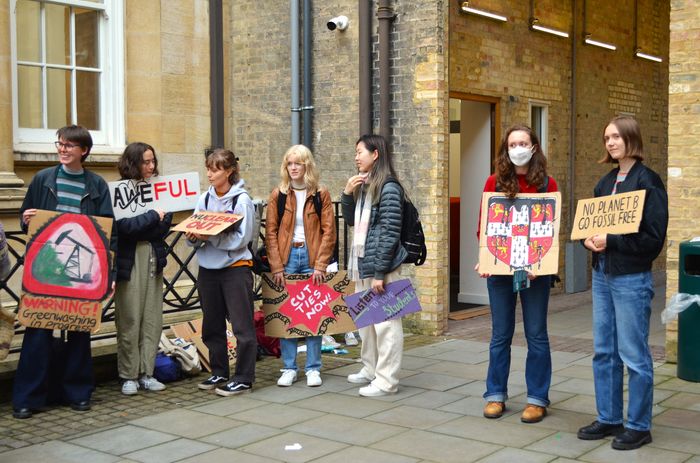Selwyn bashes ‘nonsense’ climate table after ranking bottom
The Climate League of Oxford and Cambridge ranked Selwyn as the Cambridge college with the worst sustainability policy

Selwyn College has branded a table which ranks Cambridge colleges by their climate policies as “complete nonsense”, after being put in bottom place.
Every college was given a score of below 50% in the 2024 Cambridge rankings of the Climate League of Oxford and Cambridge (CLOC), prompting calls from student campaigners for colleges to “step up” their climate policies.
Selwyn was ranked lowest of the 31 colleges with a score of 6.9%, followed by Peterhouse (9.5%) and Trinity (10.3%).
Jesus achieved the highest score (48.8%), and was commended for having a “comprehensive” emissions reductions policy, having eliminated all direct investments in fossil fuels, and having sourced all electricity from renewable sources between 2018 and 2022.
Colleges were evaluated on their policies on decarbonisation, investments and partnerships with fossil fuels, and climate governance. CLOC’s findings were advised by five Oxbridge-based researchers.
Selwyn was given a low score for efforts to “delink” from fossil fuels, mentioning that it banks with Barclays, “one of the largest fossil fuel financers in the world”.
CLOC also mentioned that Selwyn has no publicly available donations policy or decarbonisation strategy, and no net zero target, only a “vague” sustainability strategy.
One environmental sciences student at Selwyn told Varsity that the findings are “a harsh indictment of the climate policies at this college”. “Cambridge colleges are in a perfect place to lead on sustainability, but need to be clear, transparent, and effective with their policies to mitigate further harm to our planet,” they said.
The student also claimed that the college “has not valued the material changes they could make to mitigate their climate impact,” referring to heating cuts at Selwyn last year which the college said were taken for sustainability reasons.
During the cuts, the college thanked students for buying gilets and beanies to keep warm.
A Selwyn spokesperson, however, told Varsity that the table is “complete nonsense,” claiming that the College was “one of the pioneers of divestment from fossil fuels, as acknowledged by Varsity. We have taken no donations from fossil fuel companies.”
“This summer we installed more solar panels on the roof of one of our buildings, saving 22,000 kg of CO2 annually. We pioneered ground source heat pumps for our refurbished student accommodation. We have won a University of Cambridge Green Impact award, which is one of the many things that seem to have been ignored by this survey,” they continued.
Peterhouse, ranked second-bottom of the table, and Trinity, ranked third-bottom, were also penalised for banking with Barclays.
One Trinity student told Varsity that they were “surprised and disappointed” by Trinity’s score, claiming that the college “prides itself on net zero targets” yet “must do much better at being transparent” about its climate policy.
Will Beattie, a CLOC representative, said: “CLOC encourages colleges to engage with their students more openly. This is achieved by highlighting where colleges can improve their sustainability policies and transparency. The scores show that there is still a long way to go, but we hope that CLOC provides the motivation for the colleges to do more.”
A member of Cambridge Climate Justice (CCJ), a student activist group, said: “CLOC is helpful as it clearly shows where colleges need to step up when it comes to their sustainability policies. There has been recent success in getting the University to take climate action but more is direly needed, and we will continue to speak out about this, using CLOC as evidence to support us.”
A Trinity College spokesperson told Varsity: “Trinity College Cambridge is committed to improving its sustainability, both in terms of its investment and its estate. The College is divested from all fossil fuel exposure in public equities, as part of its commitment to achieving net zero in its endowment before 2050. We have completed a carbon mapping of our investment portfolio to create a baseline, set targets for reducing both direct and indirect emissions, and continue to actively engage with companies in which we hold shares”.
They added: “Recognising that more needs to be done, the College’s Working Group on Heating Systems has ambitious targets and action is ongoing to achieve those, which will significantly reduce Trinity’s carbon footprint.”
The University of Cambridge and Peterhouse were contacted for comment.
 News / Caius mourns its tree-mendous loss23 December 2025
News / Caius mourns its tree-mendous loss23 December 2025 News / Clare Hall spent over £500k opposing busway 24 December 2025
News / Clare Hall spent over £500k opposing busway 24 December 2025 Comment / Yes, I’m brown – but I have more important things to say22 December 2025
Comment / Yes, I’m brown – but I have more important things to say22 December 2025 Interviews / Politics, your own way: Tilly Middlehurst on speaking out21 December 2025
Interviews / Politics, your own way: Tilly Middlehurst on speaking out21 December 2025 News / King appoints Peterhouse chaplain to Westminster Abbey22 December 2025
News / King appoints Peterhouse chaplain to Westminster Abbey22 December 2025









